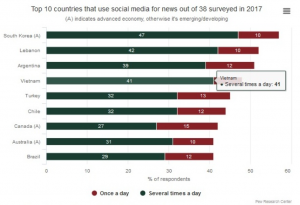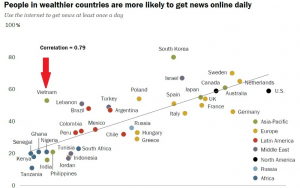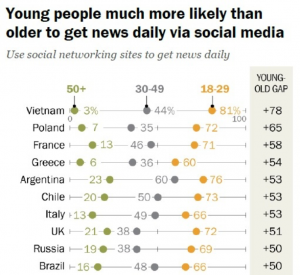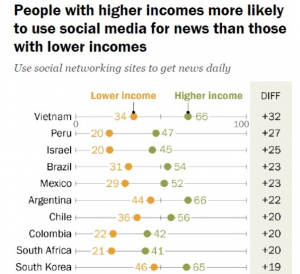How the Vietnamese Use the Internet, Including Social Media
“Since most young Vietnamese, including those planning to study overseas, are online, one question to ask yourself is: how big is your digital footprint in Viet Nam?”
With 57 million active social media users, it comes as no surprise that most Vietnamese get their news from the Internet. Mark Ashwill, managing director of educational consulting company Capstone Vietnam delves deeper into the country’s online habits.
In a population of about 96 million, 64 million Vietnamese are online, which adds up to a remarkable Internet penetration rate of 67%, according to the new 2018 Global Digital suite of reports from We Are Social and Hootsuite.
57 million of them are active social media users, a penetration rate of 57%. To put this in perspective there were 204,125 Vietnamese online in 2000 and nearly 21 million in just eight years.
Last year, Viet Nam catapulted into 7th place worldwide for the number of Facebook users, surpassing Thailand and Turkey, a 40% increase in six months.
For better or for worse, the average amount of time that Vietnamese spend online every day is nearly seven hours, including 2 and a half hours using social media.
94% access the Internet every day and 71% watch videos on a daily basis, which underscores the importance of using videos in as a form of digital marketing.
It, therefore, comes as no surprise that most Vietnamese get their news from the Internet, including social networking sites like Facebook, Twitter, and others. In the case of Viet Nam, “others” includes Google+, LinkedIn and Zing Me. This is one finding of the 2017 Global Attitudes Survey of people in 38 countries administered by the Pew Research Center, a nonpartisan US organization based in Washington, D.C.
One reason is Viet Nam’s high literacy rate compared to any country but especially one at its stage of development, i.e., borderline middle-income, according to the World Bank. Another is widespread Internet access via 3G and, increasingly 4G mobile networks, and wi-fi, which is ubiquitous and reasonably priced. Finally, Vietnamese are inveterate readers of all kinds of news both on- and offline. The logical conclusion is that most are probably getting their news from both sources.
As you can see in the graph below, Viet Nam ranked 4th among the 38 countries surveyed in the percentage of respondents who check social media sites for news once a day or several times a day.
Source: Pew Research Center. Graph appeared in a related VNExpress International article.
Here’s another revealing visual look at where Viet Nam stands in this regard among all countries:
Source: Pew Research Center
Drilling down a bit deeper, the graph below indicates that 84% of Vietnamese between the ages of 18 and 29 get their daily news from the Internet. Like many countries, Vietnamese who access news through social media sites daily tend to be younger, more educated, and wealthier.
Source: Pew Research Center
The results are similar for those who get their daily news from social networking sites. (Facebook is #2 in Viet Nam, according to SimilarWeb.)
Source: Pew Research Center
The age gap is greatest among Vietnamese netizens.
Source: Pew Research Center
Viet Nam also has the highest gap between those netizens who are “lower” and “higher” income BUT more of its “lower income” people are using social media for news than in many other countries.
Note to Colleagues Whose Institutions Recruit Vietnamese Students
Since most young Vietnamese, including those planning to study overseas, are online, one question to ask yourself is how big is your digital footprint in Viet Nam? This includes online articles, free online courses, webinars, live chat, videos, Facebook ads, etc. If you want to reach out to potential students, you need to have a meaningful and sustained digital and offline presence.
In addition, your material should be attractive, appealing, and in Vietnamese, including any landing pages, so that students and, more importantly, their parents, the key decision makers who hold the purse strings that make overseas study possible, can easily understand the content. Digital marketing in Viet Nam for any enterprise, including education, is not a frill but a necessity.
Dr Mark Ashwill is managing director and co-founder of Capstone Vietnam, a full-service educational consulting company with offices in Hanoi and Ho Chi Minh City in Viet Nam. Ashwill blogs at An International Educator in Vietnam.






Leave a Reply